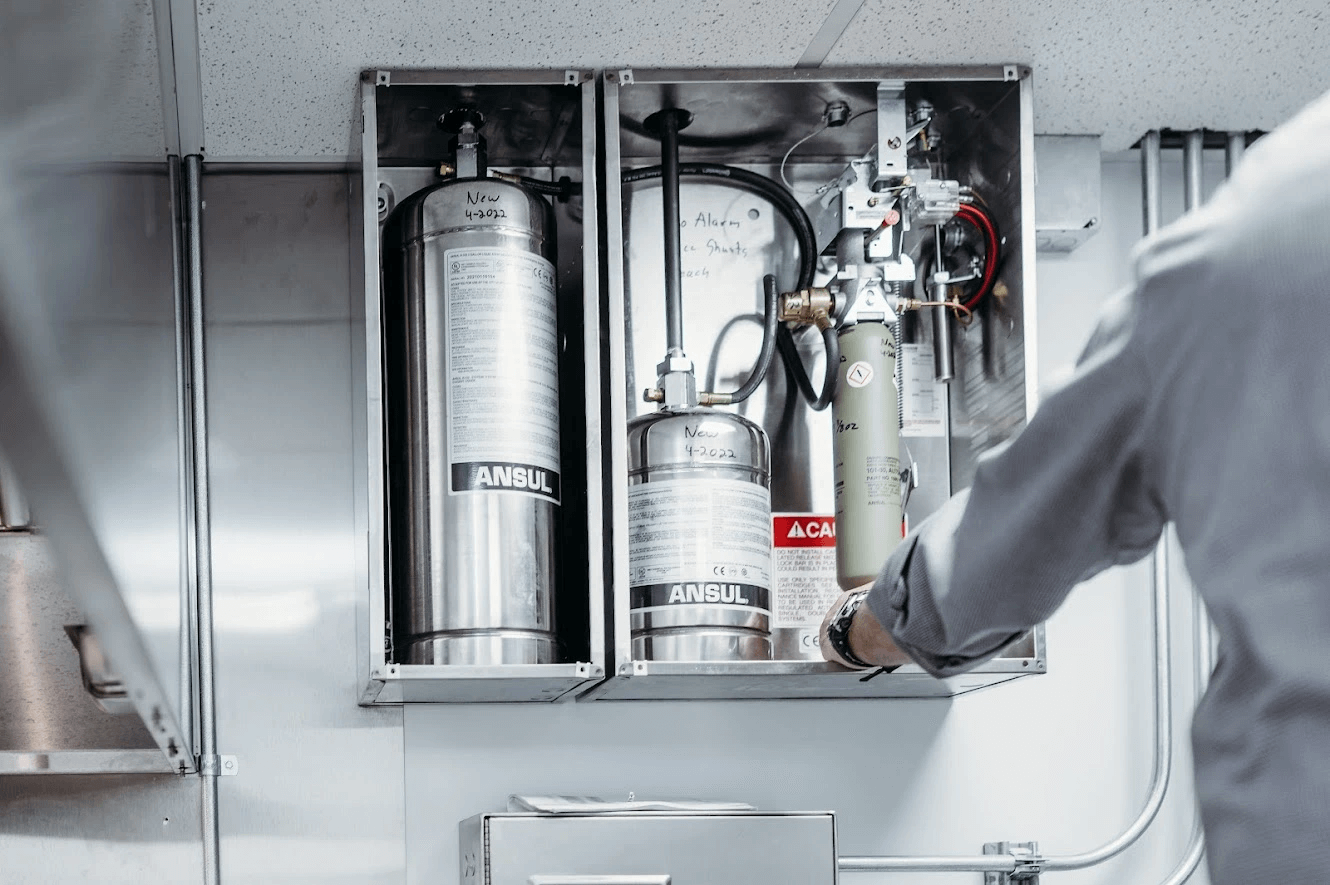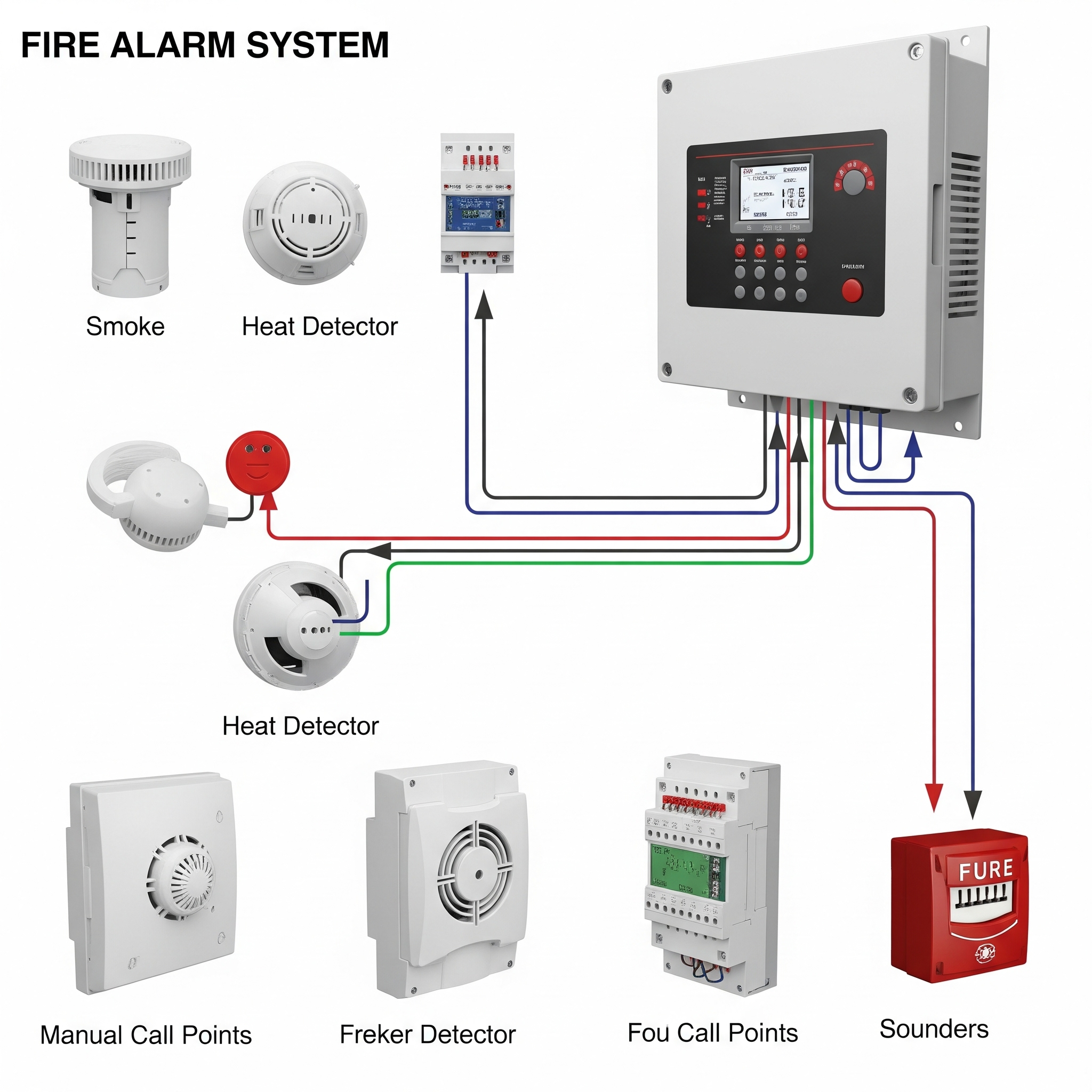In a country where skyscrapers dominate the skyline and temperatures can soar beyond 45°C, fire safety is more than a regulatory requirement, it’s a vital part of responsible building design.
Across the UAE, fire alarm systems are not just compliance tools but life-saving technologies that enable early detection, fast evacuation, and real-time response coordination.
From high-rise residential towers in Dubai to industrial warehouses in Sharjah, these systems protect people, property, and operations alike.
This article explores the essentials of fire alarm systems and why they are critical for UAE buildings, highlighting how Daem Fire Fighting Contracting Company delivers premier fire alarm system services that align with UAE Civil Defense codes and international safety standards.
Contact Us Now!
Your Project, Our Priority: Fast & Reliable Approvals
Table of Contents
What Is a Fire Alarm System in a Building?
A fire alarm system is an integrated network of smoke, heat, flame, or gas detectors connected to a central control panel. When danger is detected, the system activates audio-visual notification appliances and may alert emergency services directly.
These systems are mandatory in nearly all commercial, residential, and industrial buildings under UAE Civil Defence regulations.
The system performs three essential functions:
- Detection: Sensors identify early fire indicators such as smoke, heat, gas, or flame.
- Signal Processing: The Fire Alarm Control Panel (FACP) receives and verifies inputs, triggering an appropriate response.
- Notification: Sirens, strobe lights, or speakers activate to prompt evacuation and reduce panic.
Every fire alarm system built to UAE Civil Defence standards typically consists of the following components:
- Smoke and heat detectors
- Manual call points (MCPs)
- Fire alarm control panels (FACP)
- Visual and audible alert devices
- Emergency communication modules
In the UAE, fire detection is more than a compliance measure; it’s a critical safeguard for life safety, asset protection, and operational continuity. Selecting the right fire alarm type, whether conventional, addressable, wireless, or intelligent, is essential to match building complexity and risk level.
Partnering with a certified contractor like Daem Contracting company ensures:
- Full compliance with UAE Civil Defence codes
- Expert system design and tailored installation
- Seamless integration with emergency protocols
- Avoidance of common errors such as:
- Inadequate detector placement
- Faulty or non-compliant wiring
- Neglected maintenance schedules
🡺 Explore Daem’s fire system services or contact our technical team for a personalized consultation.
Why Fire Alarm Systems Are Essential in UAE Buildings?
Fire alarm systems are indispensable in UAE buildings as they play a vital role in protecting lives and property while ensuring full regulatory compliance. By detecting fires in their earliest stages, these systems enable faster evacuation and emergency response, significantly reducing damage and downtime.
Moreover, compliance with UAE Civil Defence codes is mandatory, and well-maintained systems can lead to reduced insurance premiums and smoother coordination with first responders.
Still struggling with rejected drawings, endless revisions, and delayed permits?
Let Daem authority approval services in Dubai & Sharjah handle the approvals for you… faster, compliant, and without the stress.
1. Early Detection Saves Lives
Early detection remains the first and most vital line of defense in fire safety. Modern fire alarm systems rely on a range of specialized detectors to identify threats at their earliest stage, allowing time for safe evacuation and rapid intervention. These detection components typically include:
- Optical smoke sensors: Identify slow, smoldering fires.
- Heat detectors: Respond to rapid temperature rise or fixed thresholds.
- Gas and flame detectors: Monitor for toxic fumes or visible flames.
By enabling immediate alerts, these systems help prevent injuries, reduce property loss, and support automated emergency protocols.
UAE Civil Defence and NFPA 72 standards recognize early-stage detection as a mandatory pillar of approved fire protection infrastructure.
2. Fire Risk Mitigation in High-Rise Buildings:
High-rise buildings face unique fire safety challenges, longer evacuation times, vertical evacuation routes, and increased occupant loads. Installing an advanced fire alarm system reduces these risks by ensuring fast detection, early evacuation, and immediate suppression response.
Such systems typically include:
- Multi-zone smoke and heat detectors positioned across floors,
- Integrated evacuation alarms with voice alerts and visual strobes,
- Automatic suppression modules (e.g., sprinklers or clean agent systems) are triggered by fire signals.
By responding quickly and precisely, these systems minimize casualties, prevent fire spread across levels, and comply with UAE Civil Defence regulations for high-rise safety.
3. Legal Compliance with UAE Fire Safety Codes
In the UAE, installing a certified fire alarm system is not optional—it is a legal obligation enforced by the UAE Civil Defence.
All new buildings, whether residential, commercial, or industrial, must obtain a fire alarm installation certificate before occupancy. This certificate verifies that the system meets national fire safety codes, including compliance with NFPA 72 standards and Dubai Civil Defence (DCD) regulations.
Failure to comply can result in fines, project delays, or insurance complications. Beyond regulatory compliance, implementing an approved fire alarm system reflects a developer’s commitment to safety, risk prevention, and operational responsibility.
🡺 Learn how Daem Contracting ensures full legal compliance and helps you avoid costly regulatory issues.
4. Seamless Emergency Service Integration
Modern fire alarm systems in the UAE are designed not only to detect danger but also to initiate immediate communication with emergency responders. These systems often include:
- Two-way intercom systems: enabling real-time dialogue between occupants and rescue teams.
- Voice evacuation modules: broadcasting clear instructions throughout the building.
- Automatic alert transmission: sending signals directly to Civil Defence or a central monitoring station.
This seamless integration reduces response time, limits property damage, and ensures faster fire containment. According to Dubai Civil Defence and NFPA 72 standards, any approved system must support emergency communication protocols, making this feature a critical component of life safety planning.
5. Protecting Lives, Property, and Business Continuity
Installing a fire alarm system is critical for minimizing property damage, preventing casualties, and avoiding financial loss. Fire alarm systems are a strategic defense against devastating losses. They provide:
- Early detection: allowing immediate evacuation and first-response action.
- Fire containment: isolating the incident to a specific zone, preventing it from spreading.
- Operational continuity: minimizing downtime and avoiding costly shutdowns.
- Financial protection: reducing damage-related repairs and insurance liability.
In commercial or industrial buildings, a single fire event can cause millions in damages and halt operations for weeks. By implementing a compliant fire alarm system, building owners proactively protect assets, maintain service delivery, and safeguard human lives.
6. Boosting Property Value and Market Appeal
Installing a certified fire alarm system is more than a safety upgrade—it’s a value-added investment. It signals to prospective buyers and tenants that the building meets modern safety standards and reduces potential risks. In fact:
- Real estate valuers often rate properties with compliant fire systems higher, especially in commercial and residential towers.
- Insurance providers may offer premium discounts for properties equipped with advanced fire protection.
- Buyers and investors are more likely to trust buildings that demonstrate a commitment to life safety and operational continuity.
By equipping your building with a code-compliant fire alarm system, you’re not just protecting lives—you’re enhancing the long-term value and marketability of your asset.
🡺 Whether you own a villa, operate a warehouse, or manage a hotel, the right fire alarm system must reflect the nature of your facility.
Types of Buildings in the UAE and Their Fire Alarm Needs
Fire safety needs are not one-size-fits-all. In the UAE, buildings vary significantly in structure, usage, and occupancy levels—which directly affects their fire alarm system requirements. Key building categories include:
- Residential buildings
- Commercial spaces
- Industrial facilities
- Public buildings (e.g., schools, hospitals)
Each of these environments requires a different approach to detection technology, control panels, and evacuation protocols. In the following sections, we explore how fire alarm systems should be tailored to meet the safety demands of each building type.
1- High-Rise Residential Towers
In the UAE, high-rise residential buildings require fire safety systems specifically designed to handle the challenges of vertical evacuation and fire containment. These towers must be equipped with:
- Passive fire protection measures, including fire-rated walls, ceilings, and floors that help contain flames and smoke.
- Active fire alarm components, such as smoke and heat detectors, strobe lights, and sirens to ensure early warning.
- Elevator safety protocols, including automatic grounding and fire override systems, to prevent elevator use during emergencies.
Together, these features ensure that fires do not spread rapidly and that occupants have sufficient time and safe means to evacuate. Compliance with Dubai Civil Defence codes in high-rise towers is not optional—it’s a legal and operational necessity.
2- Commercial Buildings and Specialized Fire Protection Needs
Commercial facilities, such as malls, offices, and data centers—often contain sensitive electronic equipment that cannot be exposed to water. In these cases, specialized fire suppression systems using clean agents (like FM-200 or CO₂ gas) are recommended. Key fire protection features in such environments include:
- Fire-resistant walls and compartmentalization
- Addressable fire alarm systems with smoke and heat detectors
- Automatic sprinkler systems with zone-specific coverage
- Integrated emergency communication and voice evacuation systems
- A documented and regularly tested fire safety and evacuation plan
These measures are essential not only for compliance with UAE Civil Defence codes but also for minimizing operational downtime and preserving valuable assets.

Protect your business continuity and assets with a sophisticated fire alarm system for a commercial building designed to exceed the highest safety benchmarks.
3- Public Buildings: Fire Safety Standards for High-Occupancy Spaces
Public facilities in the UAE—such as hospitals, schools, universities, and hotels—are required by law to install comprehensive fire alarm systems due to their high occupancy rates. These buildings must adhere to strict fire safety measures to ensure rapid evacuation and minimize risks. Key requirements include:
- Integration with Dubai Civil Defence systems for immediate response
- Addressable fire alarm control panels
- Smoke and heat detectors throughout all floors
- Clearly marked exit signs and emergency lighting
- Sprinkler systems tailored to building layout and use
These safety elements not only ensure code compliance but also protect vulnerable populations—patients, students, guests—making them essential to any public infrastructure plan.

Keep your kitchen firing and your guests safe with a high-performance restaurant fire alarm system that blends seamless protection with full regulatory compliance.
4- Industrial Buildings: Specialized Fire Protection for High-Risk Environments
Factories and warehouses in the UAE house large-scale machinery, flammable materials, and sensitive electrical equipment, making them highly vulnerable to fire and explosions. As a result, fire alarm systems in industrial facilities must go beyond basic detection.
Key requirements include:
- Fire-resistant compartments to contain fire within zones and limit spread
- Explosion suppression systems, such as FM-200 or CO₂ agents, for high-risk machinery areas
- Addressable fire alarm panels for precise zone identification
- Heat and smoke detectors capable of operating in dusty or high-temperature environments
- Emergency shutdown interfaces linked to critical equipment
These measures are vital not only for protecting workers and assets but also for maintaining business continuity in high-risk industries.
🡺 With each environment presenting distinct fire hazards, how do you determine which type of fire alarm system delivers the right balance of speed, accuracy, and coverage?

Ensure zero downtime and total compliance with a heavy-duty fire alarm system for factories that never sleep.
Which Type of Fire Alarm System Is Best for Your Building?
Choosing the right fire alarm system depends on your building’s layout, size, occupancy, and risk level. In the UAE, four main types are commonly used:
This basic system divides the building into zones, with detectors wired directly to a control panel. While cost-effective and easy to install, it cannot pinpoint the exact location of the fire—only the zone.
- Best For:Small offices, shops, and residential buildings
- Value: Affordable installation
- Function: General zone-based detection
More advanced than conventional systems, this type assigns a unique address to each detector. When a fire is detected, the control panel displays the exact location.
- Best For: Large complexes, malls, and skyscrapers
- Value:Precise location tracking
- Function: Detector-specific alerts
📌 Compliant with UAE Civil Defence and NFPA 72 standards.
This system uses radio frequencies to connect detectors and control panels without physical wiring. It can be either conventional (zonal) or addressable.
- Best For: Heritage buildings, construction sites, or temporary structures
- Value:Easy and flexible installation
- Function:Wireless detection and alert
The most sophisticated option, intelligent systems communicate real-time environmental data to the control panel. They can distinguish between real threats and false alarms using smart algorithms.
- Best For:Hospitals, industrial sites, transportation hubs
- Value:Real-time analysis and high accuracy
- Function:Smart environmental monitoring and false alarm reduction
🔍 Still unsure which system is ideal for your project? [Contact our experts at Daem] for a tailored consultation.
Common Installation Mistakes That Compromise Fire Alarm Safety
Even the best fire alarm systems can fail if installed improperly. Below are common mistakes that compromise system integrity, response time, and compliance:
- Ignoring Code Compliance
Failing to follow UAE Civil Defence or NFPA 72 codes can lead to non-compliant systems, increasing the risk of fines, legal liability, or denied insurance claims.
- Poor Detector Placement
Installing detectors too close to vents, lights, or corners can lead to false alarms or delayed detection, especially in high-ceiling environments.
- Inefficient System Layout
An unoptimized layout may leave critical areas uncovered or lead to signal overlaps, increasing the chance of alarm failure.
- Lack of Coordination with Other Systems
Without early coordination with electrical, HVAC, and structural systems, conflicts may arise, compromising system performance and building integrity.
- Overlooking Future Expansion
Neglecting to design for scalability can result in costly retrofits when the building is modified or expanded.
- Poor Wiring Practices
Improper cable routing, grounding issues, or lack of shielding can cause communication failures, ground faults, or false alarms.
- Ignoring Sounder and Strobe Testing
Failing to test notification devices regularly can result in silent alarms during real emergencies.
- Skipping Routine Testing and Maintenance
Without scheduled inspections, detectors may become clogged or inactive, leading to system failure when needed most.
🔧 Want to ensure a flawless fire alarm installation? [Contact Daem’s certified engineers] to inspect your system and eliminate hidden risks.
Ensure Compliance & Protect Lives with the Right Fire Alarm System
Installing a fire alarm system is more than a regulatory checkbox—it’s your first line of defense against life-threatening emergencies. At Daem Contracting, we design fire alarm solutions tailored to your building’s function, risk level, and local Civil Defense requirements.
Whether you’re constructing a new facility or upgrading an outdated system, our certified team provides:
- Site-specific fire risk assessments
- Fully compliant system design and installation
- Civil Defense-approved certification
- Ongoing maintenance and testing support
🔍 Protect your property, meet legal standards, and ensure occupant safety.
Frequently Asked Questions (FAQs)
1- What is the difference between a fire alarm and fire protection system?
A fire alarm system is designed to detect smoke, heat, or flame and to alert building occupants. A fire protection system includes suppression mechanisms such as sprinklers or gas discharge systems that actively work to extinguish fires.
2- How often should fire alarms be tested in the UAE?
Fire alarm systems must be tested at least once a year by certified professionals, with proper documentation submitted to Dubai Civil Defense.
3- Can I use a wireless fire alarm in a commercial building?
Yes, as long as the system is approved by Civil Defense authorities and compatible with the building’s structure and risk profile.
4- What happens if a building fails Civil Defense inspection?
Consequences may include fines, revocation of occupancy certificates, mandatory system upgrades, or operational shutdown until compliance is achieved.
5- What are the fire safety requirements for high-rise buildings in the UAE?
Due to complex evacuation challenges in tall towers, UAE Civil Defense mandates the following:
- Manual Call Points (MCPs) on every floor
- Audio/Visual alerts in all fire zones
- Addressable fire alarm systems with precise floor-level identification
- Full integration with fire suppression systems, such as sprinklers or gas suppression
Routine inspection and certification by licensed fire safety contractors

M. Hussam Almahmoud
Business Owner | DAEM CONTRACTING LLC Dubai
M. Hussam Almahmoud Graduated From Aleppo University BSC in Mechanical Engineering, CEO and partner In White Eagkes Hen trd ( established in 2005 , White Eagle Transport Est 2008 , City care Fire Est 2010 , Daem Contracting Est 2014 , Abraj Wa Mabani cont Est 2016 , White eagles gen trd LTD Est 2021 in Manchester UK , Partner in ICE Elektronik Dis Ticarat limited Sirketi Istanbul turkey





Comments are closed